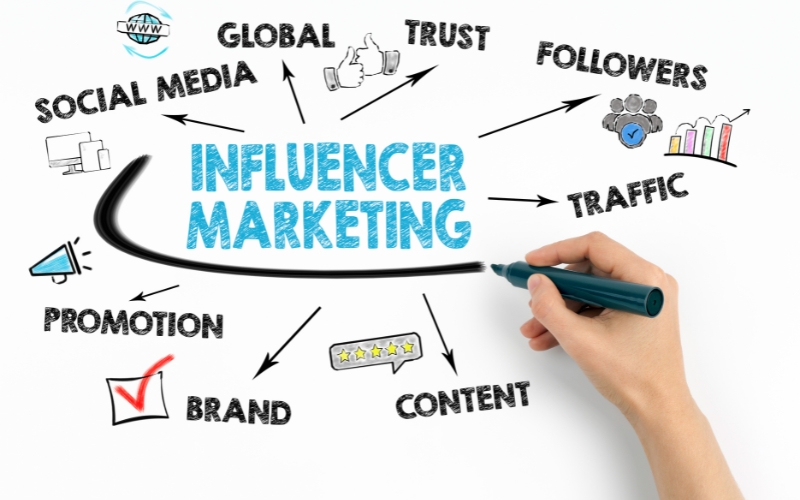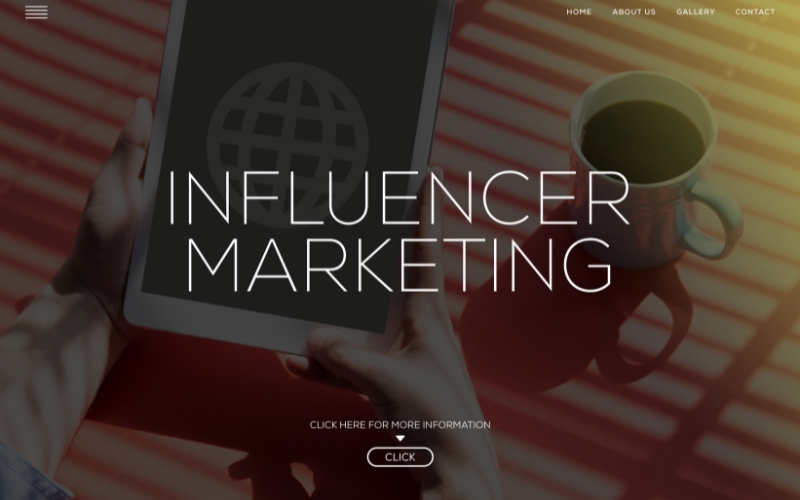
In the ever-evolving landscape of digital marketing, influencer marketing has emerged as a powerful strategy to boost brand visibility and engagement. By collaborating with influencers who have established trust with their audiences, brands can reach highly targeted groups and build authentic connections that lead to lasting brand growth. Understanding the power of influencer marketing allows businesses to harness the full potential of this marketing approach to connect with consumers, enhance credibility, and drive meaningful results.
Understanding the Power of Influencer Marketing

Influencer marketing has rapidly emerged as one of the most effective strategies for brand growth in the digital age. With the rise of social media platforms such as Instagram, YouTube, and TikTok, influencers—individuals with substantial online followings—have become powerful voices in shaping consumer opinions and purchasing behavior. Influencer marketing harnesses this influence to create authentic, engaging content that resonates with target audiences. As a result, businesses have discovered its potential to significantly enhance brand awareness, build credibility, and drive consumer engagement.
The core appeal of influencer marketing lies in its ability to reach new, highly-targeted audiences that traditional advertising methods often fail to connect with. Unlike mainstream media, influencers already have a loyal and engaged following, making their endorsement of a product or service more genuine and relatable. When influencers share their personal experiences with a brand, it feels less like an advertisement and more like a trusted recommendation from a peer. This authenticity fosters deeper connections with audiences, which can lead to higher engagement rates and increased trust in the brand.
One of the key benefits of influencer marketing is the potential to scale brand exposure. By collaborating with influencers who have established credibility within specific niches, brands can tap into highly targeted demographics. Whether a brand is aiming to reach fashion enthusiasts, tech-savvy consumers, or eco-conscious buyers, influencer marketing allows companies to work with influencers who align with their values and target audience. This tailored approach ensures that marketing efforts are both relevant and impactful.
Moreover, influencer marketing has a unique ability to increase brand credibility. When a well-respected influencer promotes a product, it signals to their followers that the brand is trustworthy and of high quality. This social proof can be a game-changer for businesses, especially in crowded markets where differentiation is crucial. Consumers are more likely to purchase from brands they trust, and influencer endorsements can effectively build this trust.
Identifying the Right Influencers for Your Brand

When leveraging influencer marketing, identifying the right influencers is crucial to the success of your campaign. The effectiveness of your strategy largely depends on selecting influencers who align with your brand’s values, resonate with your target audience, and support your overall business goals. Choosing influencers who genuinely connect with your brand ensures a more authentic message and higher engagement, leading to increased brand growth and awareness.
The first step in identifying the right influencers is understanding your brand’s core values and target audience. Influencers who share similar values and speak to your audience’s interests can provide a more authentic and relatable endorsement. For instance, if your brand emphasizes sustainability, it would make sense to partner with influencers who advocate for eco-friendly products and lifestyles. Similarly, if your brand targets a specific demographic, such as young professionals or parents, collaborating with influencers who have a strong following in that demographic will ensure your message reaches the right people.
Another essential factor to consider when selecting influencers is the type of influencer that best fits your campaign. Influencers are typically categorized into three main groups: macro, micro, and nano influencers. Macro influencers have a large following, usually in the millions, and are ideal for brand-wide visibility and awareness campaigns. Micro influencers, on the other hand, have smaller but highly engaged audiences, often between 10,000 to 100,000 followers. They are valuable for creating more targeted and personal connections with niche markets. Nano influencers have even smaller followings (under 10,000), but their audiences tend to be extremely loyal and their influence can be highly trusted.
Once you’ve determined the type of influencer that aligns with your campaign, it’s important to evaluate their authenticity and engagement rate. Influencers with a high number of followers may seem appealing, but if they lack engagement, their influence is limited. Engagement rate—measured by likes, comments, shares, and interactions with followers—is a better indicator of how actively their audience responds to their content. Authenticity is equally vital, as followers can easily detect when influencers are promoting products they don’t genuinely support. Look for influencers who consistently engage with their followers and create content that aligns with their personal brand.
Additionally, examining audience demographics helps ensure that the influencer’s followers match your target market. Tools such as social media analytics or influencer platforms can provide insights into factors like location, age, gender, and interests, allowing you to make informed decisions.
Creating Compelling Campaigns with Influencers

Influencer marketing has proven to be one of the most effective ways to build brand awareness, drive engagement, and generate leads. However, to truly harness its power, it’s essential to design compelling campaigns that resonate with your target audience while ensuring the influencer’s voice aligns with your brand tone. By developing clear strategies and collaborating effectively with influencers, you can create campaigns that stand out and deliver measurable results.
The first step in creating a successful influencer marketing campaign is to set clear and measurable goals. Are you aiming to increase brand awareness, drive sales, or boost engagement? By defining specific objectives, you can measure the success of your campaign and adjust strategies accordingly. Setting goals also helps in selecting the right influencers for the job. For example, if your goal is to increase brand awareness, working with macro influencers who have a broad reach might be more appropriate. If your aim is to increase engagement or target a niche market, micro or nano influencers with highly engaged audiences would be a better choice.
Once your goals are set, the next step is to collaborate with influencers on content creation. One of the most effective ways to engage an influencer’s audience is by giving them creative freedom to produce content that feels authentic to their personal style. When influencers are allowed to craft content that aligns with their usual tone and approach, their followers are more likely to trust the message. It’s important to provide influencers with clear guidelines about your brand’s key messages and values, but avoid overly controlling their content. Let them incorporate their personality and style while staying aligned with your brand’s essence.
The influencer’s voice should always match the tone of your brand. This is essential for ensuring that the content feels organic and not forced. If your brand is known for being fun and casual, it’s important that the influencer’s content mirrors that vibe. On the other hand, if your brand is more professional or premium, you’ll want to collaborate with influencers who can speak with authority and credibility in your industry. Whether it’s through educational content, product reviews, or storytelling, the influencer should communicate your message in a way that feels natural to their audience while representing your brand’s identity.
Finally, measuring the success of your campaign is crucial for understanding its impact. Use tools to track engagement metrics such as likes, shares, comments, and click-through rates. Monitoring these analytics allows you to gauge the effectiveness of your campaign and make data-driven decisions for future influencer marketing efforts.
Measuring the Impact of Influencer Marketing on Brand Growth

Measuring the impact of influencer marketing is crucial to understanding the effectiveness of your campaigns and determining the return on investment (ROI). Unlike traditional advertising, influencer marketing provides measurable results through engagement metrics, sales, and website traffic. By tracking the right indicators, businesses can optimize their campaigns, identify successful strategies, and fine-tune their approach for maximum brand growth.
One of the most immediate ways to measure the success of an influencer marketing campaign is by evaluating engagement metrics such as likes, shares, comments, and mentions. These metrics indicate how well an influencer’s content is resonating with their audience. High engagement rates suggest that the content is interesting, relatable, and sparking conversations. To evaluate engagement, track the influencer’s posts and the number of interactions over time. This helps assess not only the content’s popularity but also the level of interest in the brand being promoted. Analyzing the engagement rate—calculated by dividing the total engagement by the number of followers—can provide valuable insights into how effectively the influencer is connecting with their audience.
Another key metric to monitor is the increase in website traffic. Influencers often share unique links or discount codes with their followers, driving them to a specific landing page or product page on your site. By using tools like Google Analytics, you can track the referral traffic generated by these influencer posts. This will show how many users clicked on the influencer’s link and visited your website. Analyzing this data can help determine if influencer marketing is driving quality traffic that leads to conversions.
Sales and conversions are perhaps the most critical metric for evaluating ROI. By tracking affiliate links or promo codes used by followers, you can directly measure how many sales were driven by the influencer’s campaign. This allows you to calculate the financial return on your influencer marketing investment. It’s also valuable to compare sales numbers before, during, and after the campaign to assess its long-term impact.
Using analytics tools can further help in evaluating the effectiveness of your influencer marketing strategy. Social media platforms, like Instagram and YouTube, offer built-in analytics, while third-party tools like Hootsuite, Sprout Social, or Influencity provide detailed reports on campaign performance. These tools give you insights into audience demographics, engagement patterns, and other important metrics that can guide future campaigns.
Building Long-Term Relationships with Influencers

In influencer marketing, the key to sustained success often lies in building long-term relationships with influencers. While one-off collaborations can provide a quick boost to brand awareness, ongoing partnerships can have a more profound impact on brand loyalty, trust, and long-term growth. Establishing continuous relationships with influencers ensures that your brand remains top-of-mind for their audience, fostering a sense of authenticity and consistency that drives deeper engagement.
The foundation of a long-term influencer marketing strategy is based on mutual trust and respect. It’s essential to view influencers not just as content creators but as valuable partners in promoting your brand. By nurturing these relationships, brands can tap into influencers’ credibility and authenticity, which are key factors in influencing purchasing decisions. Influencers who genuinely support a brand and believe in its mission are more likely to deliver content that resonates with their followers, which in turn enhances the brand’s reputation.
One significant advantage of long-term influencer partnerships is the opportunity to build brand loyalty. When influencers consistently endorse your products or services, their audience becomes more familiar with your brand, which can lead to stronger brand recall and higher trust levels. Over time, this consistent exposure can translate into more significant sales and deeper customer relationships. Additionally, loyal influencers who feel valued and included in your brand’s journey are more likely to advocate for your brand across various platforms, helping to expand your reach and impact.
Sustained collaborations also allow brands to evolve alongside their influencers. As trends and consumer behaviors change, influencers can provide valuable insights into what resonates with their audience. By maintaining a long-term relationship, brands can stay informed about the latest shifts in the market and adapt their strategies accordingly. Influencers often have an authentic pulse on their followers’ needs and preferences, which can be a goldmine of information for refining marketing campaigns.
Furthermore, long-term influencer marketing efforts often result in cost savings over time. Influencers who are already familiar with your brand require less effort in terms of briefing and campaign setup. Since they understand your values and voice, the content they create will align more seamlessly with your overall marketing goals, reducing the need for extensive revisions or adjustments.
Conclusion:
To further understand how influencer marketing can be used effectively for brand growth, it’s important to explore case studies and insights from experts in the field. For example, this comprehensive guide on influencer marketing provides valuable strategies on building successful campaigns and measuring their impact. By learning from industry leaders, brands can refine their approach and optimize their influencer partnerships for maximum reach and engagement.
Influencer marketing has proven to be a game-changer for businesses looking to elevate their brand presence and expand their reach. By carefully selecting the right influencers, creating compelling campaigns, measuring success, and nurturing long-term relationships, brands can achieve sustainable growth and strengthen consumer loyalty. Ultimately, influencer marketing, when executed strategically, can foster a deeper connection with audiences and establish a trusted, lasting brand presence in the marketplace.
For more details or to discuss your specific Influencer Marketing, visit our Influencer Marketing Services page.

